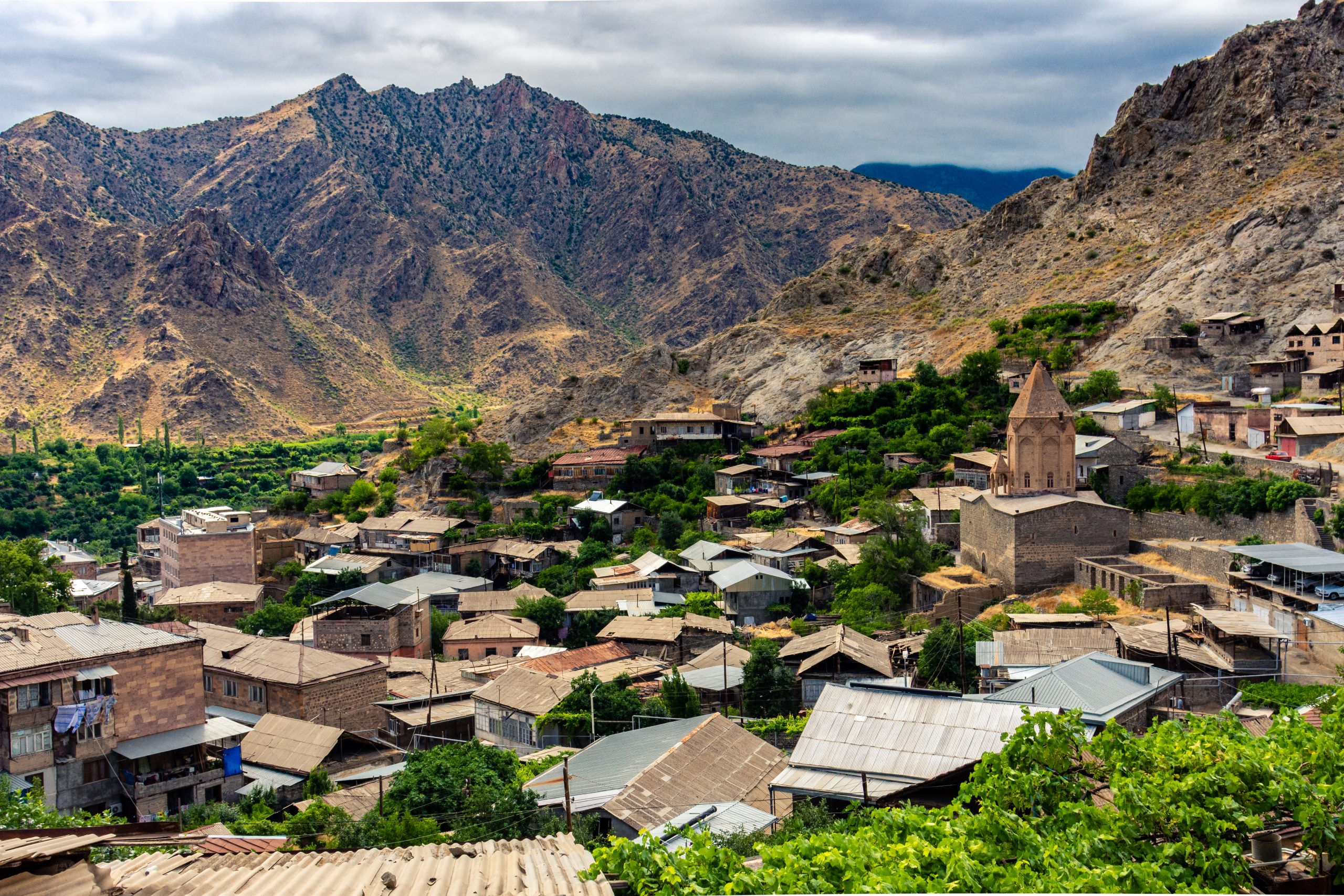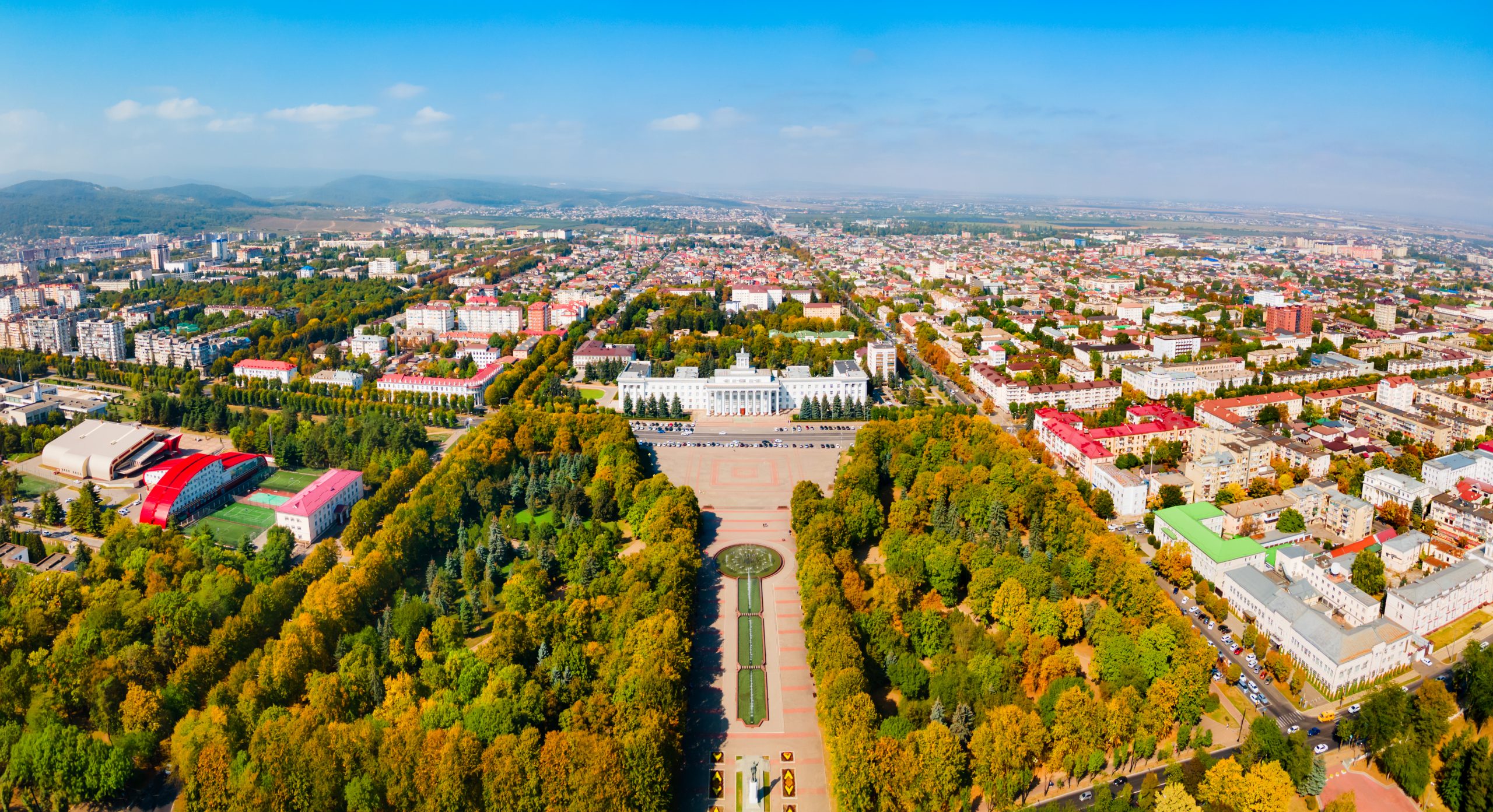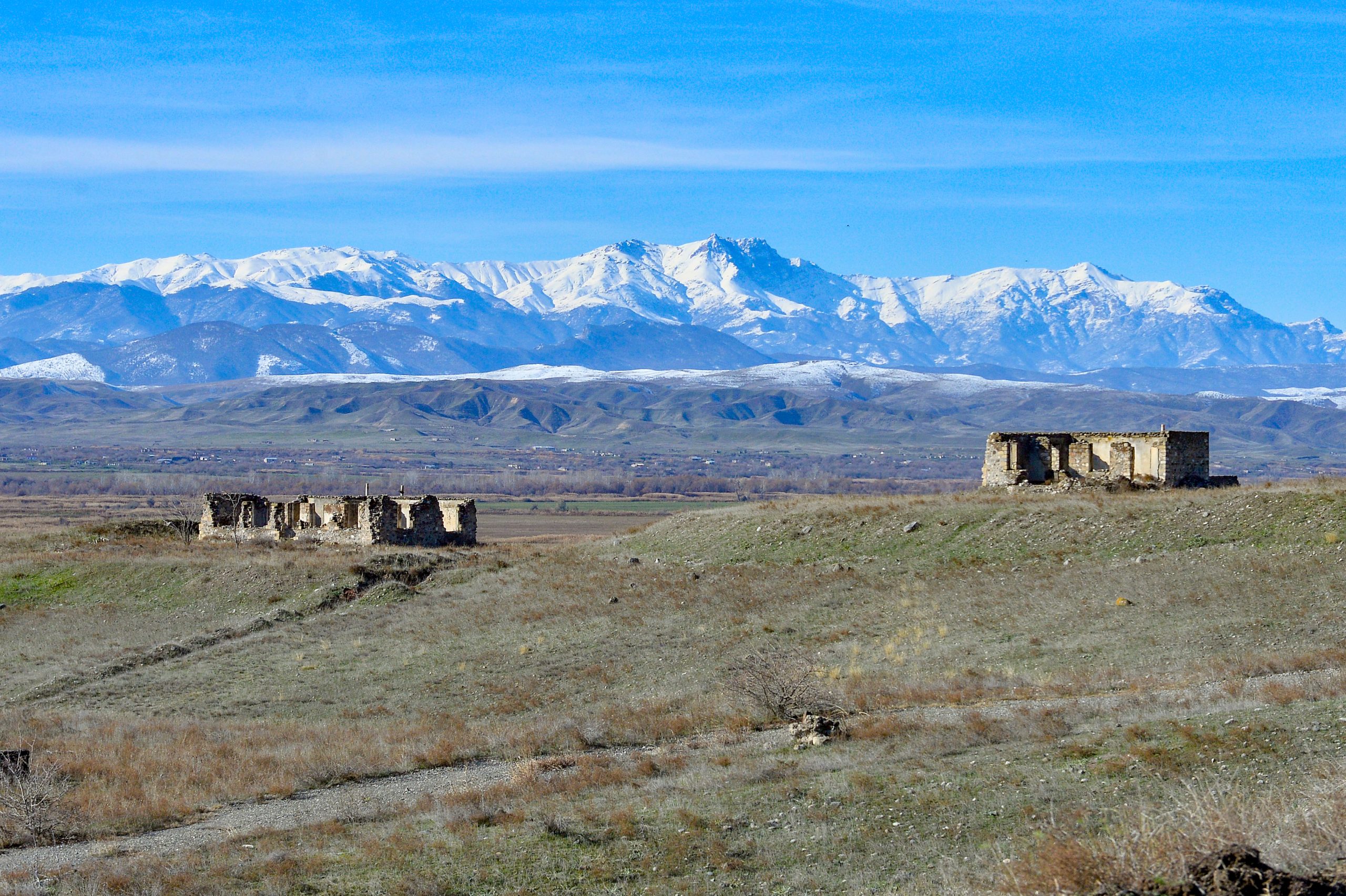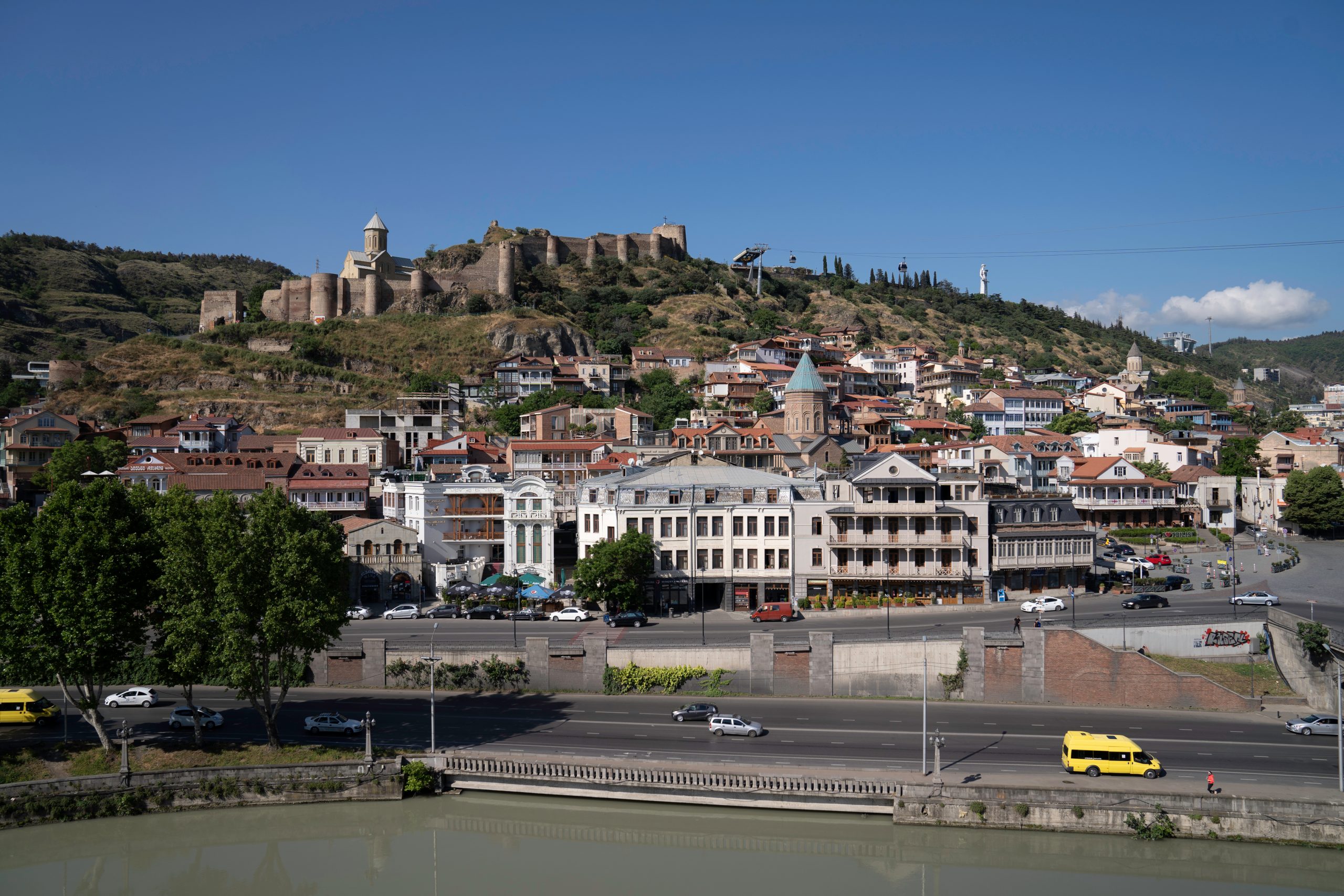Strategic Analysis Caucasus Brief
Bi-weekly review (28.6. – 11.7. 2021)
Tomáš Baranec and Marina Avram
Armenia

Meghri, Armenia. Photo: Xavier L. Dalmau/ Shutterstock.com
Armenia and Iran to increase cooperation in Hi-tech
Construction of a high technology centre in Armenia for B2B meetings and sectoral discussions was proposed by Iran on June 30 during a meeting of the Armenian Minister of Economy Vahan Kerobyan with the Deputy for Policy Making and Strategic Evaluation at the Vice Presidency for Science and Technology of Iran Mehdi Elyasi.
The Iranian side said it has a rich experience in establishing high-tech centres in different countries, suggesting establishing a similar centre in Armenia. “Establishing a joint technology park by Iran and Armenia is a good idea, and we will attempt to launch the park over the course of six months,” the Armenia official said.
The Iranian side claimed their companies are interested in cooperating with the Armenian side in various areas of the economy, including industry, construction, agriculture, food, textiles, pharmaceuticals and medical equipment production. Elyasi then unveiled some of the projects they had prepared to propose to the Armenian side.
Besides the proposed high technology centre, Elyasi said Iran is ready to equip Armenian medical institutions with Iranian equipment, as well as suggested considering the possibilities of creating a joint “smart city”.
The meeting also referred to the bilateral cooperation within the framework of “Meghri” and “Aras” free economic zones. Taking into account Armenia’s membership in the Eurasian Economic Union (EAEU), the parties discussed the possibilities of organizing joint productions in different sectors of the economy and exporting the manufactured products to the EAEU to other countries.
Iran plans to set up two houses of innovation and technology in Syria and Russia in the near future with the aim of finding new markets for domestic knowledge-based products in the region. A house of innovation and technology has already been set up as a technology exchange office in China, Mehdi Ghalehnoei, an official with the vice presidency for science and technology, said, IRNA reported.
Sources:
- Panarmenian.net, „Iran proposes building high technology centre in Armenia“, https://www.panarmenian.net/eng/news/294001/Iran_proposes
- tehrantimes.com, „Armenia welcomes setting up joint technology park with Iran“, https://www.tehrantimes.com/news/462623/Armenia-welcomes-setting-up-joint-technology-park-with-Iran
Fifteen Armenian POWs released in Russian mediated deal
On July 4, Azerbaijan handed over to Armenia 15 prisoners of war (POWs) sentenced to imprisonment by the court in exchange for minefield maps in the Fizuli and Zangilan districts. The agreement was reached with Russian mediation.
According to the Azerbaijani MFA, with the help of the received minefield maps, it will be possible to save tens of thousands of lives, including those of sappers. This will speed up the construction and reconstruction projects in these territories, as well as the process of returning internally displaced people home. “As a humane step, Azerbaijan has handed over to Armenia 15 people of Armenian origin, who had been sentenced to imprisonment and whose prison terms have expired,” reads the Azerbaijani MFA statement, cited by the Caucasian Knot.
“We express our gratitude to Rustam Muradov, Commander of the Russian peacekeeping contingent temporarily deployed in the territory of the Republic of Azerbaijan, for his mediation services in the implementation of the humanitarian initiative to obtain mine maps”, continues the statement.
According to the Armenian government, the repatriated prisoners were among the 60 Armenians captured in December last year in clashes in the Hadrut region of Nagorno-Karabakh.
Twelve of those released on Saturday had been sentenced to six months in prison for “illegally crossing the Azerbaijani border”, though they were initially charged with “terrorism” and “mercenary activity”. Two others who remain in custody were sentenced to four years in prison, and another, Lebanese-Armenian Vicken Euljekian, was sentenced to 20 years in prison.
Two Syrians who were accused of fighting as mercenaries for Azerbaijan were also sentenced to 20 years in prison in Yerevan in May.
Sources:
- AVETISYAN Ani, OC Media, “Fifteen Armenian POWs released in Russian mediated deal”, https://oc-media.org/fifteen-armenian-pows-released-in-russian-mediated-deal/
- Caucasian Knot, “Azerbaijan hands fifteen detained Armenian militaries over to Armenia”, https://www.eng.kavkaz-uzel.eu/articles/56020/
For additional information, see:
- NATIQQIZI Utar, Eurasianet.org, “Armenian soldiers on trial in Azerbaijan”, https://eurasianet.org/armenian-soldiers-on-trial-in-azerbaijan
EU to allocate over 1.5 billion EUR to Armenia for five major projects
In the next five years, the EU will allocate more than 1.5 billion EUR to Armenia for five key programs, including the development of the Syunik region.
The document was presented on July 3 in Brussels, highlighting the initiatives that the European Commission intends to implement by 2025 in the member states of the “Eastern Partnership”.
As for Armenia, the European Commission plans to: support 30,000 small and medium-sized businesses for a sustainable, innovative, competitive economy; promote socio-economic development and communication by supporting the North-South highway corridor; investments in information technology, science and technology; strengthen the resilience of the southern regions of Armenia and investing in green Yerevan for energy efficiency and the launch of more environmentally friendly buses.
Sources:
- Armenpress.am, “EU to allocate over 1.5 billion Euros to Armenia for five major projects”, https://armenpress.am/eng/news/1057313.html
- Civilnet.am, “Armenia to Receive up to Almost $1.9 Billion from European Union”, https://www.civilnet.am/news/625195/armenia-to-receive-up-to-almost-1-9-billion-from-european-union/?lang=en
Nagorno Karabakh de facto authorities pledge to solve problems of Armenians displaced by the recent war
De facto authorities assure that the housing problems of the families of all forced migrants who stay in Nagorno-Karabakh will be resolved within three years.
In Stepanakert (Az. Khankendi), they began building a new micro-district intended for the families who became refugees as a result of last year aggravation of the Karabakh conflict. The Karabakh de facto government has stated that refugees from Shushi (Az. Shusha) and Hadrut will receive housing in Stepanakert as city residents, while the rest of the families will be resettled in rural communities or in new settlements built specifically for them.
Vaan Savadyan from the Hadrut District has noted for the Caucasian Knot that “if the housing issue is resolved, then Hadrut residents will return to Artsakh (Nagorno-Karabakh).” He said that only half of the residents of the Hadrut District returned to Karabakh after the war.
Gayane Ambartsumyan, a public figure from the city of Shushi, claimed for the informational portal that most of the families of forced migrants, who are now in Armenia, have to live in rented apartments. According to her story, many want to return but into their own housing.
The “Caucasian Knot” has reported earlier that after the last autumn war in Karabakh, up to 40,000 people became forced migrants; of them, 25,000 are still in Armenia.
Sources:
- Caucasian Knot, „Nagorno-Karabakh authorities announce terms for resettling refugees“, https://www.eng.kavkaz-uzel.eu/articles/55960/
- Caucasian Knot, „Karabakh refugees demand help from Armenian government“, https://www.eng.kavkaz-uzel.eu/articles/55431/
Baku establishes three new economic regions. Two of them in Karabakh
Azerbaijani President Ilham Aliyev signed a decree on changing the division of the country into economic regions. As Jam News informed, three new regions appeared on the economic map of the country at once – Karabakh, East-Zangezur and Baku.
East-Zangezur economic region should encompass the Jebrail, Kelbajar, Gubadli, Lachin and Zangilan regions, which came under the control of Azerbaijan as a result of the second Karabakh war.
The document notes that the unification of these five regions in one economic zone is dictated by their finding for many years as part of the Zanguzur province, established in 1861, located on the border with Armenia, and stretching from Lachin and Kelbajar to Nakhichevan, located on the Zangezur plateau, surrounded by the Zangezur mountain range. “These areas have traditional socio-economic, cultural and historical ties”, reads the presidential decree.
Aghdam, Shusha, Fizuli, Terter, Khojavend and Khojaly regions, as well as the city of Khankendi (arm. Stepanakert), should be included in a Karabakh economic region. Many of these regions also came under the control of Baku as a result of the second Karabakh war.
Yet, some of them (the cities of Stepanakert, the Khojaly region and part of the Khojavend region) are currently not under the control of the Azerbaijani authorities and a Russian peacekeeping contingent is located in these territories. “It is important to create the Karabakh economic region for its restoration and ensure the speedy development of this region”, the document says.
Sources:
- JAM News, “Karabakh and East Zangezur economic regions are created in Azerbaijan”, https://jam-news.net/karabakh-and-east-zangezur-economic-regions-are-created-in-azerbaijan
The Development of Tbilisi Pride Week: Activists vs Radical Opposition
Pride celebrations in Tbilisi were supposed to take place on July 1-5. However, after violent attacks from the side of far-right groups against the pro-LGBT “For Freedom” demonstration, the LGBT Pride March was cancelled in favour of a silent rally outside the Parliament building on Rustaveli Avenue on July 5. Further, it developed into violent far-right protests, a tense standoff that broke the police lines several times and provoked many injuries.
The first day of Pride Week held on July 1, ended with clashes with the police, where 20 people were detained and accused of petty hooliganism and disobedience to the law enforcement agents. Hundreds of members of right-wing groups, as well as the Union of Orthodox Parents, tried to disrupt the closed screening of the March of Honor documentary about the problems faced by sexual minorities in Georgia. The visiting guests, including diplomats accredited in Georgia, were insulted and pelted with eggs.
After violent groups opposed the event of five days of LGBT+ Pride, activists called people on July 5 to “come out for solidarity” and protest in silence.
The Georgian far-right groups and those affiliated with the newly founded ultraconservative movement ERI (Unity, Essence, Hope- based on homophobic and xenophobic stance) held a counter-rally on July 5, called March for Dignity. The anti-pride rally organized by them concluded with 20 seriously injured reporters, and at least 53 journalists were verbally and physically assaulted at the hands of violent far-right protesters.
Several journalists’ heads were bruised, some received concussion and eye injuries, others had their teeth knocked out, and numerous bruises on their bodies. Most of them needed hospitalization. As well the equipment of several media outlets was destroyed. As a result, numerous organizations have responded to violence against the media in recent days in Georgia. However, many journalists and media management decided to temporarily suspend its work.
“I decided, despite the huge public interest, to withdraw all the groups and stop covering this abomination, primarily because of the threat to the health and life of my journalists”, Nika Gvaramia, the director of Mtavari said.
“It was not the police who were supposed to stand here, but the special forces. How many journalists got beaten? I watched these people chase journalists to kill them, and there were only a couple of cops. Unfortunately, this day will go down in history as the day when we were persecuted and when the government and the Ministry of Internal Affairs proved incompetent in protecting journalists”, writes Marika Nikuradze, photographer and co-founder of OC Media
The list of injured journalists is extensive, it includes almost all TV channels: Mtavari Arkhi, Formula, TV Pirveli, Rustavi 2, Channel One, Imedi, as well as online news agencies, including Netgazeti, Tabula, On. Ge. , Journalists “Guria News”. This list may not be complete, as journalists are still being attacked by the far-right mobs. Local journalists have claimed they were targeted and deliberately beaten by violent radical groups.
Public Defender of Georgia, Nino Lomjaria, said in a special briefing that the journalists have shown civic heroism and that “journalists are human rights defenders whose heroic work prevented the worst from happening. They also documented the violence”.
The Georgian President Salome Zourabichvili, who visited one of the injured journalists, said the violence was a “violation of the core fabric of Georgia”.
The radical groups primarily led by Levan Vasadze took down and burnt the European flag outside the Parliament of Georgia. It happened minutes after police allowed them to take over the parliament square after the anti-violence, pro-LGBT+ rally left the scene. Police did not prevent the move, despite being heavily present in the area.
The Interior Ministry said on July 7 the counterprotest “exceeded the limits of the law on freedom and peaceful assembly” and took on a violent form. Of the 100 detainees, law enforcement released 68 on parole, while 32 remain in temporary detention, according to the latest report. Further, the Georgian Interior Ministry launched an investigation into the incident on two counts: obstruction of the work of journalists and violence. With no detentions yet.
Before the break out of the persecution of the media, Prime Minister Irakli Garibashvili claimed it inappropriate to hold a march on Rustaveli Avenue, arguing that the rally contains the danger of civil unrest. “As you know, holding this rally is unacceptable for the majority of the population”, – said the Head of the Government.
The Georgian Orthodox Church (GOC) on June 29 called on members of the European Parliament working group on LGBTQ issues and embassy heads in Georgia “to refrain from supporting and encouraging Tbilisi Pride.” In the same statement, the GOC urged the Georgian government to prevent “the destabilization of the country and of public life.” GOC was accusing the organizers of the nearing Tbilisi Pride of “propagating a non-traditional way of life under the guise of protecting human rights,” the Orthodox Church said the event “contains signs of provocation, conflicts with socially recognized moral norms, and aims to legalize grave sin.”
“Violent far-right crowds supported by (the) Church & emboldened by (an) incredibly irresponsible statement of PM (Garibashvili) gathered in Tbilisi centre to prevent Pride March, attacking journalists & breaking into Pride office,” wrote Giorgi Gogia, who works for U.S.-based Human Rights Watch.
According to Transparency International Georgia, the state’s response to violence against the media does not stand up to scrutiny, and its inaction further encourages aggressive groups. Several Western embassies in Georgia issued a joint statement condemning the attack and calling on authorities to ensure freedom of expression and assembly. “Violence is simply unacceptable and cannot be excused,” the statement said.
One of the beaten journalists – cameraman of the TV Pirveli channel – Aleksandre Lashkarava died on July 11, 2021.
Despite some recent improvements in the legal system, Georgia is considered to be one of the most intolerant countries in the post-Soviet space towards queer people. In a 2019 survey by CRRC Georgia, 87% said they would disapprove of a person like them doing business with a homosexual.
Sources:
- KINTCHA Shota, oc-media.org, “Tbilisi Pride Week kicks off amidst far-right protests”, https://oc-media.org/tbilisi-pride-week-kicks-off-amidst-far-right-protests/?fbclid=IwAR1FvA841M6Ggj-Q_fSHHxK43vlk-sUG6TpPNTb48LfOL7VlYH0eOxsTooY
- NARIMANISHVILI Nino, jam-news.net, “Media hunted: Over twenty reporters injured during anti-Pride rally in Tbilisi”, https://jam-news.net/media-hunted-over-twenty-reporters-injured-during-anti-pride-rally-in-tbilisi/?fbclid=IwAR2FksFfHL85BudSvr6cJCZXf-A0t9kVaXwhe_l6Sl1L2ICE8rb2YbkRrEo
- Web1.rustavi2.ge, “ I consider it inappropriate to hold the march on Rustaveli Avenue – Irakli Garibashvili”, https://web1.rustavi2.ge/en/news/203671?fbclid=IwAR3xbCs4hA9r37Ln9ZFVFXDev4ka7iIjT8NNU81O_FnHeWDh_5Wfe47RfyI
- Reuters.com, “LGBT+ campaigners in Georgia call off pride march after office attack”,
- https://www.reuters.com/world/europe/protesters-storm-lgbt-campaigners-office-tbilisi-before-planned-march-2021-07-05/?fbclid=IwAR0IIUsZsHsGV7rsvswCsI0gSBZfmai-HvsnDUorTVYEsU3FIj9UbxXn42Q
- Civil.ge, “Hate Groups Take down, Burn European Flag at the Parliament”, https://civil.ge/archives/430973?fbclid=IwAR0sFpikBA71I9gZ5v1ANaILdXjM0IN9yapOFBI2sJZJDorYKW58iq4MMIQ
Irish-owned call centre left hundreds of employees without salaries
Hundreds of call centre workers in Tbilisi fear they will be left without their final month’s pay after a call centre providing services to the Irish online education company the Shaw Academy closed, informs the OC Media.
Employees of the Georgia based Precision Services, which is owned and operated by Shaw Academy founder Adrian Murphy, received text messages at the end of June informing them that their services were no longer required. Several former call centre workers confirmed to the OC Media that they had not been paid their last month’s salary.
Teo Kavtarashvili, a former customer support representative, said the company contacted them at the end of June, telling them not to come to work as they were experiencing a “technical difficulty” but that their missed days would count as paid holidays. As payday approached on June 30, Kavtarashvili said they were notified again that the salaries would be late “by several weeks”. Kavtarashvili also told the OC Media that eventually, employees were fired without notice and after that, the company contacted around 40 of them and rehired them at a new company. “Our labour rights have been grossly violated”, she added.
The Georgian labour union, the Solidarity Network, who intend to represent the workers in the mediation process, said that the number of employees left by Precision Services without their last month’s salary as well as compensation for abrupt termination was in the hundreds.
The Shaw Academy, founded in Dublin in 2013, boasts of teaching over 100 courses to 12 million students. However, the company has met with controversy over some of its business practices and is currently being sued in the UK for allegedly hiding €450,000 in VAT liabilities to investors, the Irish Times reports.
Sources:
- KINCHA Shota, OC Media, „Hundreds ‘left unpaid’ in Georgia after Irish-owned call centre closes“, https://oc-media.org/hundreds-left-unpaid-in-georgia-after-irish-owned-call-centre-closes/
EU Enlargement Commissioner visits Georgia
The European Commissioner for Neighbourhood and Enlargement, Olivér Várhelyi, began his first mission to countries of the Eastern Partnership, where on July 6-9 he has met the Georgian Parliament Speaker Kakha Kuchava, lawmakers, Prime Minister Irakli Garibashvili and Georgian Orthodox Church Patriarch Ilia II.
Varhelyi thanked Kuchava for returning the EU flag back to its place after it was torn down by the far-right protesters in the country on July 6. The parties discussed the ongoing processes in Georgia, including electoral and judicial reforms, the forthcoming elections, and the work of international observers.
At the meeting at the legislature, MPs of all political parties – including Speaker Kakha Kuchava and Education Committee Chair Shalva Papuashvili from Georgian Dream, Khatia Dekanoidze of the United National Movement, Badri Japaridze of Lelo, Aleksandre Rakviashvili of Girchi met with the European Commissioner. Várhelyi claimed that “now all parties should sign the April 19 political agreement and work together to implement it”, alluding to the UNM, the largest opposition group which refrained from joining the deal.
Meeting Prime Minister Garibashvili, Varhelyi presented the economic and investment plan that the EU is launching for the Eastern Partnership countries. The parties reviewed the Free trade Agreement (FTA), regional developments, Georgia’s Euro-Atlantic course, and €3.9 billion EU package to the country’s transport and logistics connectivity.
“I once again wish to confirm that our country – the absolute majority of our population – almost 80% supports the European integration of our country”, emphasized Garibashvili at the meeting, claiming that “we all agreed that foreign policy of our country is the Euro-Atlantic integration, which is irreversible, which will not be revisited or altered.” Being confident that Georgia “will become a fully-fledged member of the EU one day”.
At the meeting with the Patriarch, the parties discussed the EU support for Georgia’s territorial integrity.
The Commissioner underlined that in the political area, progress was made on electoral reform, but that the EU wants to see the same progress in judicial reform. He also condemned the recent attacks during the anti-Tbilisi Pride rally. “Freedom of expression unhindered by violence or any discrimination needs to be done away with. All must enjoy the right of reunion, freedom of expression. Therefore, we want everybody to respect this. Therefore, we want to see how the procedures are going on,” he stated.
Sources:
- Caucasuswatch.de, “EU Enlargement Commissioner visits Georgia” , https://caucasuswatch.de/news/3934.html
- Euneighbours.eu, “European Commissioner for Neighbourhood and Enlargement visits Georgia and Azerbaijan to present new Plan for Eastern Partnership”, https://www.euneighbours.eu/en/east/stay-informed/news/european-commissioner-neighbourhood-and-enlargement-visits-georgia-and
- Civil.ge, “EU Enlargement Commissioner visits Georgia”, https://civil.ge/archives/431044
North Caucasus

Nalchik, Kabardino-Balkarian Republic, Russian Federation. Photo: Saiko3p/ Shutterstock.com
The CTO regime declared in Kabardino-Balkaria. Human rights defenders suggest it could be staged
The regime of counterterrorist operation (CTO) was declared in the cities of Nalchik and Baksan in the Kabardino-Balkarian Republic (KBR) on July 3, claiming the lives of five alleged militants.
According to law enforcers, alleged militants were blocked in a house located in the territory of a gardening partnership in a suburb of the city of Nalchik. They were offered to lay down their arms and surrender but opened fire in response. As a result, militants were liquidated, the operative headquarters has reported.
However, human rights defenders interviewed by the Caucasian Knot suggest, CTO might be staged after some sources claimed that five persons later declared as liquidated militants had earlier been kidnapped.
According to Zaur Shokuev, a lawyer of the Kabardino-Balkarian Human Rights Centre, the version that all five persons declared militants were kidnapped and then killed and that the special operation was staged looks plausible.
“Earlier, there have been similar cases when relatives complained about the disappearance of a family member kidnapped by law enforcers and a few days later their bodies were found during a counterterrorist operation. And I think a staged shootout is necessary in order to make the staged CTO realistic,” Zaur Shokuev told the “Caucasian Knot” correspondent.
Svetlana Gannushkina, the chair of the NGO “Civic Assistance”, trusts the version, according to which the people declared militants were kidnapped before the special operation. “I trust Nadezhda Kevorkova because she is a serious investigator. I am convinced that if she says something, then there are good reasons for that. Meanwhile, unfortunately, the situation when people are kidnapped, and then they mysteriously turn out to be militants is ordinary,” Gannushkina told the Caucasian Knot correspondent.
The CTO regime announced on July 3 became the first such case in KBR since the CTO conducted in September 2019.
Sources:
- Caucasian Knot, “Nalchik and Baksan residents tell about situation during CTO”, https://www.eng.kavkaz-uzel.eu/articles/56014
- Caucasian Knot, “CTO regime lifted in KBR”, https://www.eng.kavkaz-uzel.eu/articles/56018/
- Caucasian Knot, “Sources tell about kidnapping of five persons before CTO in Nalchik”, https://www.eng.kavkaz-uzel.eu/articles/56023/
- Caucasian Knot, “Human rights defenders suggest CTO in Nalchik could be staged”, https://www.eng.kavkaz-uzel.eu/articles/56032/
- Caucasian Knot, “CTO regime in Nalchik was the first one during past year in KBR, https://www.eng.kavkaz-uzel.eu/articles/56017/



Contact us